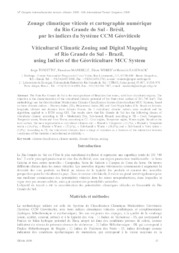Zonage climatique viticole et cartographie numérique du Rio Grande do Sul - Brésil, par les indices du Système CCM Géoviticole.
Zonage climatique viticole et cartographie numérique du Rio Grande do Sul - Brésil, par les indices du Système CCM Géoviticole.
Autoria: TONIETTO, J.; MANDELLI, F.; WEBER, E.; HASENACK. H.
Resumo: Abstract: The State Rio Grande do Sul is the main producer of Brazilian fine wines, with four viticultural regions. The objective is the characterization of the viticultural climatic potential of the State (total surface of 281.749 km2). The methodology use the Géoviticulture Multicriteria Climatic Classification System (Géoviticulture MCC System), based on three climatic indices ? Dryness Index (DI), Heliotermal Index (HI) and Cool Night Index (CI). Based on latitude, longitude, altitude and distance from Atlantic Ocean, the 3 viticultural climatic indices were modeled and the algorithms applied to a DTM using GIS. The results show that Rio Grande do Sul has the following classes of viticultural climate: according to DI ? Moderately Dry, Sub-humid, Humid; according to HI ? Cool, Temperate, Temperate warm, Warm and Very Warm; according to CI ? Cool nights, Temperate nights, Warm nights. Based on the total surface, the most representatives viticultural climates are: « Humid x Temperate » (3,1%), « Humid x Temperate warm » (14,4%), « Humid x Warm » (52,6%), « Sub-humid x Warm » (20,0%) and « Sub-humid x Very warm » (5,8%). According to CI, the viticultural climates have a range of variation as a function of the interaction between « earlyness of the varieties x heliothermal availability ». Key words: climate classification, climate models, climatic Groups, zoning
Ano de publicação: 2006
Tipo de publicação: Artigo em anais e proceedings
Unidade: Embrapa Uva e Vinho
Observações
1 - Por padrão são exibidas publicações dos últimos 20 anos. Para encontrar publicações mais antigas, configure o filtro ano de publicação, colocando o ano a partir do qual você deseja encontrar publicações. O filtro está na coluna da esquerda na busca acima.
2 - Para ler algumas publicações da Embrapa (apenas as que estão em formato ePub), é necessário ter, no celular ou computador, um desses softwares gratuitos. Sistemas Android: Google Play Livros; IOS: iBooks; Windows e Linux: software Calibre.
Acesse outras publicações
Acesse a Base de Dados da Pesquisa Agropecuária (BDPA) para consultar o acervo completo das bibliotecas da Embrapa.

